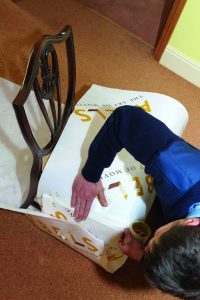25 Top Tips for Moving House UK – The Ultimate Guide
Moving house can be stressful and there are a lot of steps involved, at Abels we have moved thousands of happy customers over the years including royalty. As the home moving experts, we have prepared our top tips for moving home for you below to try and take the stress out of your big move.
Please don’t hesitate to contact us if you want any further advice or information about our expert moving solutions.
1. Plan Early.
Don’t leave planning to the last moment especially if you already have a buyer.
If this is a full house move then a survey should be arranged so that an assessment can be made of all of your possession to ascertain their volume, how best to protect the items, discuss your specific moving requirement, assess the access to your property and if it will be suitable for a large removal vehicle, what floor you live on and the distance you’re moving.
The moving company can then provide you with an accurate quotation, allowing the correct time to perform the service and including the materials that you require.
2. Do Your Research
It is important to have 2-3 well-researched companies perform a survey, check that they are at least members of the BAR (British Association of Movers) as they provide a financial guarantee should the mover go into liquidation.
Remember that the industry is unregulated, there are one or two rogues out there who could take your money/possessions.
Have questions ready to ask all of the potential candidates.
3. Have a big clear out before you move
Moving house is the perfect opportunity to go through things and have a clear out before you pack to try and make your move as efficient as possible.
4. Confirm the date of your move
In most house moves there are a lot of moving parts and variables. As a result, planning can be very difficult.
At Abels, we’ve helped move countless households and businesses and are aware of and understanding of the problems that can arise. However, our advice would always be to make sure that you confirm the date of your move before starting most of our house moving tips.
5. Advise change of address to utility suppliers, bank, phone, insurers, friends etc.
Ensure that you have contacted your gas and electrify suppliers and informed them of your move within any relevant notice period. It is also important to speak to your car, phone or home insurance providers as well as the bank and any other services who need your address or regularly contact you by post.
6. Relax with our professional packaging option.
If you have selected a professional packing option; live in your home as normal, leave items where they are and the moving team will select them as they require to pack the cartons.
7. Arrange travel plans.
Arrange any travel plans that need to coincide with your move in advance, book hotels if necessary.
8. Cancel regular deliveries.
Cancel deliveries that are regularly made to you i.e. newspapers or milk.
9. Collect any items stored locally.
Collect items that you have in local shops (if you are moving away from the area) such as dry cleaning or items in for repairs. Return any borrowed items such as library books, equipment rentals.
10. Try to find a babysitter if possible.
Consider making arrangements for pets and children to stay with friends or relatives during the actual moving day as this can sometimes reduce personal worry on the day.
11. Pack a box just for essentials.
Make sure that you pack essential items for your first day/night in a clearly labelled, easy to reach, box. We recommend including at least the following items in your essentials box:
- Tea and coffee making facilities, including a kettle.
- Cleaning products, including bin bags.
- The vacuum cleaner.
- Mobile phone, tablet and laptop chargers.
- Toilet Roll.
- Duvet and bedding.
- Radio, TV, laptop or tablet.
- All important documents, such as passports and mortgage/insurance documents.
Bonus Tip: Pack up personal items that should travel with you i.e. jewellery, insurance policies, important papers, passports, required electronic devices i.e. phone/tablet, a small selection of toys to keep children amused. Take house-related keys off key-rings ready to hand these to the new owners.
12. Defrost the fridge freezer.
Empty, defrost and dry out your fridge. Use cool boxes to keep items within. Small freezers can be left with food within them and will be unplugged at the last moment of loading (however items will start to defrost especially if keys are not available for delivery)
13. Start packing early.
If you’re not used to packing it may take a lot longer than you anticipate. We do offer a complete expert packing service at Abels, but if you want to pack for yourself we advise that you start early and try to get as many items that you can live without until you’re moved in, packed and ready to go helping to make the process as stress-free as possible.
14. Label your boxes.
Make sure that you label all of your boxes clearly with which room they’re destined for, alongside a basic idea of their contents, stating if fragile or needed ASAP on moving in day (i.e. bedding), this will save you a lot of time when it comes to unpacking and putting away your belongings.
Bonus Tip: make sure you label boxes on the top and at least one of the sides, so they are easier to read when stacked up and surrounded by over boxes.
15. Measure twice, move once.
It is important to make sure that your furniture fits through all doorways at both ends of the move before items are moved, we always advise large pieces of furniture and doorways are measured before you start to move them in order to ensure that they all fit. Consider any alterations you have had done since the item was brought in.
Again, our team of expert movers are able to take care of all of this on your behalf, taking the stress out of your move.
16. Draw up a floor plan for your new home.
We recommend that you draw up a floor plan of your new property with where you’d like your furniture to go, this will help you to visualise what will work well and ensure that your furniture and larger items will all fit together nicely prior to any heavy lifting. Consider sockets and radiator locations.
17. Organise your cables and wires.
Cables and wires are notorious for tangling themselves up seemingly by magic.
When you’re moving home you will be unplugging all of your electronics and will undoubtedly end up with mountains of wires. The last thing you want to be doing once you’ve moved into your new home is untangling mountains of wires and trying to marry them up to their relevant device. That is why we recommend either trying to keep wires packed with their parent device limiting the number of electronics in one box or alternatively labelling each cable so it can be easily identified at the other end.
18. Box everything.
It’s important to box up as many items as possible, while it may seem time-consuming, boxing up items is actually more efficient as boxes are easier to store, move and transport than loose items. Equally well-packed boxes off far more protection to your belongings than moving them loose. It also helps to organise and prioritise things at both ends of the move.
Our team of expert packers and movers are always available to take care of all the packing and moving on your behalf.
If you have chosen to pack your own small effects, the following hints will help us both:
- Select the right carton for the job. i.e.:
– Large box i.e. 50*50*75cm = Odds and ends, small toys and plastics. (Lightweight)
– Medium box i.e. 50*50*50cm = China, glass, ornaments etc.
– Small box i.e. 50*30*30cm = Books, food (please ensure you check restrictions), records / CD / DVD, tools and heavy Items.
– Lay flat box i.e. 100*50*25cm = Clothing, linen, bedding. (This can remain in drawers or placed in wardrobes if they are to be shipped to conserve space).
- Use adequate tape to secure the base and top of the carton. Normally two strips across flaps then one along the gap.
- Pack heavier items at the bottom of the carton, lighter items at the top.
- Pack cartons as fully as possible, being generous with packing materials, particularly at the base and top of each carton. Crushed paper or newspaper can be used at base and top to offer a cushion. This can also benefit between layers.
- Plates should be stood on end, not laid flat – all items individually wrapped.
- Do not pack higher than the carton as this must close to provide a cube, which can be stacked on the vehicle/container.
- Stack full cartons in corners, allowing the removal team sufficient room to work.
- Clothing and paperwork can remain in drawers. Where this does not make items too heavy or put the item of furniture at risk. However, breakables, items that may fall out, and heavy objects must be removed and packed separately.
- Hanging clothes can be left in your wardrobe until the removal day when they will be transferred to a wardrobe carton (if a professional packing service agreed).
- Mirrors and pictures, which are too large for our cartons, will be protected by Abels moving team.
- Bundle and tie or tape loose items, such as brooms, shelving, garden tools etc.
- Remove ink cartridges or toners from printers and photocopiers.
19. Save time and energy later by disassembling furniture early.
If possible it makes a lot of sense to dismantle your non-essential furniture early, not only will this save your precious time on the day of your move but it will also help you to free up space in your current home for boxes and other items all ready for the big day.
20. Make use of self-storage.
Because every party involved in a move may not be working to a synchronised timeline self-storage facilities are a very useful tool when moving home. They allow movers to store furniture, belongings and larger items between properties, helping to minimise the logistical disruption. Discover more about our self-storage facilities and options here.
21. Clean up before you move in.
If possible use the time before you move in to give your new home a really good clean. The home being empty is a really great opportunity to clean it from top to bottom including the areas which may be difficult to reach later once your furniture and possessions are in place.
22. Pack heavy items (including books) in small boxes.
Lots of books in a box can get very heavy very quickly, that’s why it is a good idea to ensure that all heavy items, such as books, are packed into smaller boxes to ensure that the boxes themselves are not too heavy.
23. If you’re renting make sure you give your landlord notice.
It may seem obvious but there is a lot going when moving home and it’s easy to get caught up in the excitement and forget things, even important things like letting your landlord know that you’re moving and ensuring that you give them fair notice.
24. Make a list of where the important stuff is in your new home.
The last thing you want to be doing once you’ve settled into your new home is scrambling around in the dark for the fusebox, or hunting desperately for the stopcock while the kitchen fills up with water. That’s why it is important to establish where everything is in your new home from day one.
We recommend asking the previous owners/occupants where you can find the following:
- Stopcock
- Gas and electricity meters
- Thermostat
- Fuse box
Bonus tip: leave a list of the items above for the people moving into your home, to save them the trouble.
25. Make your bed as soon as possible after moving in.
The last thing you want to do after a long tiring move is to realise you haven’t made your bed and have to dig out all of your bedding and make your bed up when all you want to do is to get some well-deserved rest. If you make your bed as soon as possible in the day then you’ll have one less job to do when you’re finally ready to get to sleep.
Let the experts take care of it.
At Abels Moving Services, our expert teams of movers and packers have been moving families for decades, our goal is to take the stress out of your move. If you’d like a quote or more information from one of our experts, please don’t hesitate to get in touch with the team.


